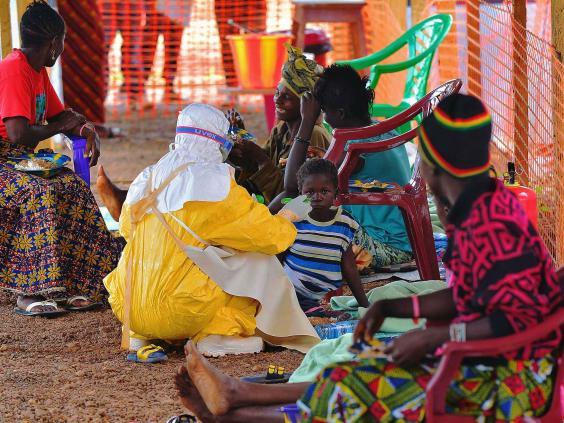Ebola: Did it ever really go away? A timeline of key events
The virus has killed more than 11,000 people in four years with the latest outbreak hitting the Democratic Republic of Congo

Your support helps us to tell the story
From reproductive rights to climate change to Big Tech, The Independent is on the ground when the story is developing. Whether it's investigating the financials of Elon Musk's pro-Trump PAC or producing our latest documentary, 'The A Word', which shines a light on the American women fighting for reproductive rights, we know how important it is to parse out the facts from the messaging.
At such a critical moment in US history, we need reporters on the ground. Your donation allows us to keep sending journalists to speak to both sides of the story.
The Independent is trusted by Americans across the entire political spectrum. And unlike many other quality news outlets, we choose not to lock Americans out of our reporting and analysis with paywalls. We believe quality journalism should be available to everyone, paid for by those who can afford it.
Your support makes all the difference.Thousands of people have died from Ebola since an outbreak erupted in West Africa four years ago.
While the World Health Organisation (WHO) declared the epidemic over in 2016, a new outbreak has been reported in the Democratic Republic of Congo (DRC), where at least 44 people have been infected with the virus and 23 deaths are under investigation.
Here, The Independent looks at the origins of outbreak of the deadly virus, which has never really gone away.
28 December 2013
A two-year-old boy named Emile Ouamouno dies of a mysterious haemorrhagic fever in the Guinean village of Gueckedou after playing with fruit bats. His mother, three-year-old sister, and grandmother all died shortly afterwards.
The virus begins to spread, carried to nearby villages by mourners and a healthcare worker.
23 March 2014
Guinea confirms that the disease is the haemorrhagic fever Ebola, which was first discovered in 1976. To date, it has killed 59 people in the West African country.
8 April 2014
The funeral of venerated healer Mendinor, attended by hundreds of mourners, leads to the spread of the virus to Sierra Leone and Liberia.
West African tradition demands that mourners lay hands on the corpse and each other during funerals.
24 May 2014
The Sierra Leone government decides to treat Ebola sufferers in Kenema hospital, which soon becomes overrun by patients and has no strict hygiene measures in places.
Hundreds of patients and health workers die at the hospital, where the death toll stands at more than 800.
8 August 2014
The outbreak is declared an international emergency by WHO after the virus reaches the Nigerian capital of Lagos, a major industrial hub which is home to 21 million people.
24 August 2014
British volunteer nurse William Pooley becomes the first Briton to contract Ebola after working in Sierra Leone. He is flown back to the UK for emergency treatment and goes on to make a full recovery
September 2014
A major fightback begins after the humanitarian organisation Medecins Sans Frontieres calls the international response “slow and derisory”.
Countries including the UK and US respond by constructing new treatment facilities in West Africa and training health workers in infection prevention.
7 October 2014
Fears grow in Europe when a Spanish nurse becomes the first person to contract the virus outside West Africa.
She contracted the disease after treating a priest, who was flown home to Spain after contracting Ebola in Sierra Leone.
9 October 2014
The UK announces that it will introduce temperature screening for passengers arriving at Gatwick and Heathrow from West Africa.
28 December 2014
Scottish nurse Pauline Cafferkey is given the all-clear from Ebola at Heathrow on her return from Sierra Leone, but soon falls ill with the virus and is kept in isolation in London’s Royal Free Hospital for several weeks.
January 2015
WHO announces a ‘turning’ point in the Ebola crisis, as the number of new patients falls in all three of the worst-hit countries – Guinea, Sierra Leone and Liberia.
This drop is attributed to boosts in medical care and an increased caution among locals. The death toll reaches 8,800.
9 May 2015
Liberia is declared Ebola free, but cases continue in Sierra Leone and Guinea.
July 2015
Three more cases of Ebola are confirmed in Liberia, traced back to a dog meat meal they shared.
November 2015
After being declared Ebola free for a second time, three more cases emerge in Liberia.
14 January 2016
An official end to an epidemic that killed more than 11,000 people is declared by WHO after no new cases are reported in Guinea, Liberia and Sierra Leone in 42 days (twice the length of the virus’s incubation period).
9 June 2016
Liberia is declared free from Ebola for the fourth time after a further outbreak in April.
11 May 2017
The DRC reports eight suspected cases of Ebola, including four deaths, in the province of Bas Uele. Two months later, WHO declares an end to the outbreak.
8 May 2018
An Ebola outbreak is declared in the Equateur province of the DRC, with a total of 32 suspected cases, including 18 deaths.
18 May 2018
WHO calls an emergency meeting to consider the international risks of the latest outbreak after a case of Ebola is confirmed in Mbandaka, a major city in the DRC. The current outbreak totals 44 cases, including 23 deaths.
Join our commenting forum
Join thought-provoking conversations, follow other Independent readers and see their replies
Comments